Your donation will support the student journalists of Neuqua Valley High School. Your contribution will allow us to print our next newspaper edition as well as help us purchase equipment and cover our annual website hosting costs.
Behind the screens: the impact remote learning has had on teachers
January 26, 2021
“Dear District 204 Community: Indian Prairie School District 204 is closing schools and implementing e-learning across all schools starting Wednesday, March 18… The tentative return date for on-campus classes is April 6.”
During seventh period on March 13, 2020, Indian Prairie School District 204 announced that their schools would transition to e-learning for two weeks in order to prevent the spread of the coronavirus. At that time, nobody knew that two weeks would quickly turn into two semesters within the blink of an eye. Schools have begun to transition to hybrid models that allow students to be back in the classroom alongside their teachers, but even this has held the strange feeling of dysphoria characterizing these unprecedented times.
It’s been over ten months since COVID-19 drastically changed the lives of millions. In the United States alone, there have been 25.3 million Americans infected and over 421,000 lives lost. District 204 parents have received numerous emails informing families that teachers and staff have tested positive for the virus. It’s almost everpresent: not only the actual virus, invisible in the air, but the feeling of despair and fear that hangs over our heads.
As students, we feel it too, but we often fail to remember that our own teachers are experiencing fears and trials sometimes even worse than ours. While teachers are reworking their curriculums to better prepare their students, they’re also learning how to love those same students through a screen. Scientists, adults and children are all learning about life as a result of the coronavirus, and Enoch and I had an opportunity to talk to teachers at Neuqua Valley High School about how they feel and how they want students to feel.
—
“How are you?”
The phrase consists of three simple words, but it reveals so much about a person. It provides people with the opportunity to express a range of emotions, from happiness or hopefulness to sorrow or fear. The question doesn’t have a “right” or a “wrong” answer; it’s up to a person to choose how they want to respond.
When we prompted this question at our teachers, we noticed an audible sigh: a symbol of the heavy times and the effect it’s had on them. The last time we saw these teachers was when they told us to have a great and safe weekend as we left their classrooms. How little did we know what these teachers, who we’ve known for over a year, are going through?
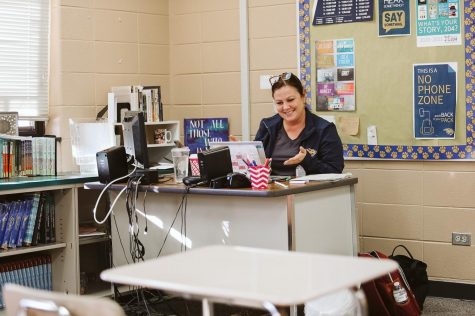
Laura Dabezic possesses a special type of humor, one that doesn’t go away even when times aren’t the prettiest. For someone who’s always full of sarcasm and wit, it seemed like there was something weighing on her mind. A cup of neglected diet Pepsi, Dabezic’s caffeinated drink of choice, sat on her desk. A sliver of sunlight slipped through her window and illuminated her face, highlighting a weary smile that was present.
That weariness wasn’t constrained within her expression.
Dabezic said that she is “doing as best as [she] can, but [she’s] really, really looking out for hope, and generally there is hope around the corner, and [she thinks] for now [she’s] looking for that hope to come… But it’s exhausting.”
Despite her pursuit for hope in the future, she began to tear up as she described her fears concerning her parent’s health.
“It really comes and goes… From a personal perspective, it’s getting harder. I mean my parents are old, and they’re not in great health, I haven’t touched them in over a year… It’s tough, trying to balance everything.”
Jeffrey Walz, a teacher who would once cheerily analyze Renaissance art with his AP European History students now sat solemnly in a room with a few scenes of Paris behind him. There wasn’t just a morning cup of coffee that he was missing; there was something more.
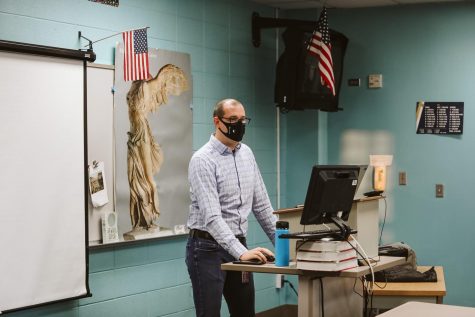
He provided us with an honest answer regarding his well being: “in context, I would say I’m not doing well. Now with that said, the situation is what it is, and that doesn’t mean that I’m not adapting and all that … As a teacher, this is not sustainable. As a parent, this is not sustainable, and that’s been something that’s kind of tough, you know.”
He noted that some of the most prominent struggles he currently faces are that he’s not sleeping as well and that there’s always some sort of stressor in his life. Whether it’s a class he teaches or something concerning his own family, there’s constantly something weighing on his mind. However, he has been able to find healthy ways to manage the situation, explaining that he and his wife work together. One of the analogies he uses to remind himself that this isn’t a “forever situation” is his experience as a parent.
“[When] my wife and I had our first child and he was probably like 3 or 4 weeks old, it was 8:00 at night. My wife and I were both brushing our teeth, exhausted, ready to go to bed, and I don’t usually sleep until like 11:00, and I’m like ‘oh my god, is this the rest of our life?’ Because my son was very colicky; he cried a lot, and we didn’t sleep during the night. I was lucky to get an hour of good sleep, and it was just a really tough time, and I genuinely had the thought that this is the rest of my life. And it so is not.”
These responses highlighted a concerning trend that is prevalent throughout the United States: a decline in the well-being of teachers. According to a preliminary study conducted by Oxford Academic, “about half of the teachers in [the] study scored above the threshold for depression and ~1 in 10 for anxiety on self-rating questionnaires. Poor mental health in teachers is significantly associated with high job demand and low social support.”
Three things correlated with our Neuqua teachers from this study: many teachers are depressed, many teachers are needed by districts, but not enough teachers have received the social support they need.
As tough as it was to hear our teachers tell us face to face that they were going through rough patches in life, it was even more disconcerting to realize that so many teachers are going through the same thing without telling their students. One word that came up in two completely separate interviews to describe how teachers felt like they were treated was “robotic.”
Social studies teacher Inna Kagan has a great understanding of relationships between people— whether they be in the curriculum or the classroom. She explained, “we’re not robots. The things that people say affect us, what happens in our day affects us… I think that that would be something I hope people would take with them, even after the pandemic, is just to remember that there’s so much going on outside of that moment… and that we’re all human.”
“I feel like I’m Tim O’Brien and that I’m carrying a lot of things.”
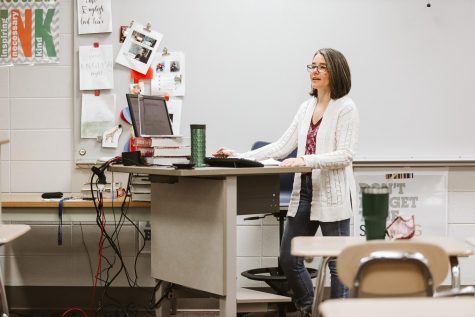
Dabezic stated that “sometimes students think that we’re just these robots that sit behind the computer, and feel like we’re more of a computer software system rather than a human being, and they don’t realize that I am dealing with a lot … I feel like I’m Tim O’Brien and that I’m carrying a lot of things.”
These tendencies revealed the frustration the teachers were experiencing. Across the interviews, it was a common consensus that teachers felt frustrated. However, it was less about the students and parents, and more about the situation.
Dabezic expanded upon this sentiment, exclaiming that, “there’s not a teacher that doesn’t want to [teach] live in front of students. No teacher is like, ‘yeah, this is the life’… Sometimes my video lags, and I’ve got kids who won’t turn on their cameras and lying about technology not working… This is exactly what I signed up for as a teacher. I mean, nobody says that!”
Dr. Elizabeth Hobbs has faced similar experiences where she has been talking to parents who are annoyed about the current situation. She noted that one of the most interesting parts about having those conversations is that those parents “literally will say to you ‘we’re actually not mad at you. We’re just mad about the whole situation,’ and [she gets] that, [she] really [does], but at the same time, you know, [she has] no control over [the situation].”
It can be difficult explaining that from time to time as well because she feels bad that it does not exactly help bring closure to parents at the time.
Teachers are figuring out and understanding the situation at the same time as students and parents within the school district are, which can be one of the most difficult parts of the situation.
Moreover, even outside of school, teachers are people. They have a family of their own. They are daughters and sons, moms and dads, sisters and brothers and so much more. The coronavirus has not only impacted their lives at school, but it has also revolutionized their lives at home and their daily routines.
Hobbs is an incredibly family-oriented person who is truly thankful that her family lives nearby for her to be able to spend time with them. She was looking forward to celebrating the holidays with her family in her new home, but as a result of COVID-19, she and her brothers have joked that they’re “taking a gap year. [They’ll] start up with [their] holidays] again next year.”
In early April, Hobbs’ younger brother had a child, and she stayed with her niece while they were in the hospital. Naturally, families come closer and love to help with a newborn, but the coronavirus completely changed this experience.
“I didn’t hold that baby for the first four or five months of her life. I just looked at her in the car seat, or when my brother or sister in law were holding her I’d look at her from afar … I know it was killing my parents, who just love being grandpa and grandma, they didn’t hold the baby. I mean, that was so hard. I could see it in their face that it was so hard for them, and at one point, we’d all been quarantined for all a bit, that was when my sister-in-law asked my mom ‘do you want to hold her?’ and my mom was like ‘yes, I want to hold her, but I didn’t want to ask because I don’t want to put you in a position that would make you uncomfortable.’ So, [my sister-in-law] said ‘yeah, you can hold her.’ And I think still to this day, I’ve only held that baby a couple of times… that was hard … I have not hugged my parents in ten months, which is strange.”
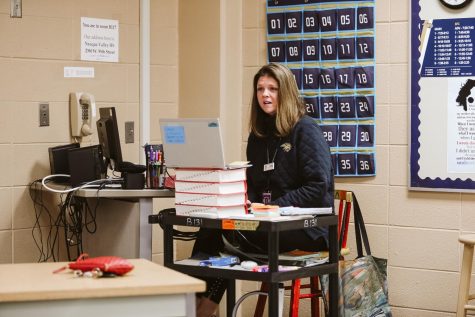
That same strange feeling has brought its way into Hobbs’ preparation for the school day.
“Truth be told, teaching online is so much more time consuming than doing it in school … I’ve had to rewrite everything I’ve ever done, it takes longer to rewrite it to recreate the slides to come up with new activities to change things around.”
It can also be incredibly difficult to complete work for school, while simultaneously managing the life they have at home. It’s almost impossible to separate the two entities.
“First of all, there’s no break … It’s like your computer is one room away, and there’s no real ‘I’m home now’ versus ‘I am at work now’ … I feel like the guilt is hard sometimes cause I feel like even if I get up and I step aside, … there’s a feeling that’s kind of like gnawing at me that it’s still here: like my computer is still on, and I know that I still have three or four things to do before the night’s over.”
“All the experts say you’ve got to find balance, you’ve got to be able to make this sustainable. That’s really hard to do, and I know students are struggling with it too … It’s all just remote, so everyone feels like they should just be at their computer.”
Walz is a parent of two, who has also struggled with balancing both his home and work life. While scheduling our interview with him, Walz referenced and laughed at the obscure times he was giving us because of his children’s schedules.
His family has created binders of Walz’s teaching schedule, his wife’s work schedule and their son’s kindergarten schedule.
“If anyone were to walk into our house, they would probably wonder why we have these [binders] literally posted in every room. I mean, I have one in my closet, and as I’m getting ready for the day, I’m like ‘oh my god, it’s Monday I forgot!’ You know, ‘it’s Tuesday, and at 7:25, I need to be there.’ It’s a lot.”
Managing everything is more of a family effort, with his wife watching the kids in the mornings and him taking over when his life sessions are over.
“I jump in. I do the kindergarten thing and then my three year old wakes up at 3:30 and kindergarten’s over. I try to get them out of the house at some point cause my wife will then work through six o’clock. I’ll try to make dinner, we’ll get that done, and then in the evening, I’ll try to go back to grading and even just kind of changing things over. It’s not even that I’m working more hours, it’s just like these basically thirty minute chunks of time blocks that have been figured out throughout the day.”
While timing has been a large source of concern, something that scares him more is how the current situation is going to impact his children’s development.
“Six year olds can’t do independent learning. They can’t even do Zoom learning … It is a source of anxiety for sure … It’s tough because three and six year olds are really social, and there’s a lot of just development that happens at that age. I worry as a parent like: are there milestones that are being missed, especially my youngest? Is he not learning three year old play? I would say it’s definitely something that concerns me, and I frequently am looking for new ideas of how to expose them to cognitive stimulation that they otherwise would be getting naturally.”
His experience being a parent at this time has also changed his perspective on how he supports his students. He has young children and recognizes that some students have younger siblings, so he knows how difficult it is to be productive.
“I’ve got 150 students, and I genuinely believe I’ve got 150 different life situations right now. You know, when we’re in school, there’s at least that commonality of like ‘right now, in the room, we’re right here’ and so there’s kind of this equalizer. But gosh, I’ve got kids emailing me ‘I might not be in class, I’ve got to go get my covid test.’ Yeah well then, don’t worry! Don’t worry about class; that’s what needs to be your priority.”
Walz described being a teacher as a “very person-oriented occupation” and that it’s difficult to provide for his students during this time and truly be there for them.
“I have a full length mirror propped on the wall opposite of my computer so I can see myself, so at least there’s another person. Like, there’s a human! It’s me.”
“I’ll tell you, I have five periods. One of my periods, zero cameras on. Three of them, less than three cameras on. Then [in] my Euro [class], I have about 12 or 13 cameras on. I have a full length mirror propped on the wall opposite of my computer so I can see myself, so at least there’s another person. Like, there’s a human! It’s me. But at least it feels like there’s someone else there. It’s tough, especially cause now I’m like upstairs in this guest room door closed. I’m like physically removed from where my family’s at even, so I told my wife yesterday, it’s pretty lonely.”
Students having their cameras off was a common occurrence mentioned by each teacher. Hobbs explained that cameras being off can sometimes make it harder for teachers to communicate and connect with their students.
“It’s hard to not think they’re disconnected [or] uninterested, and it’s not necessarily true cause sometimes then I’ll ask a quick question… in the chat and then you get all those answers and you’re like ‘oh good, you are still paying attention.’”
Natural communication is a large part of learning, and there have been times where teachers will tell a joke and kids will have a reaction. Whether it’s an eye roll or a laugh, there is some sort of reaction that is taken away when learning through a screen.
It can be very hard for teachers to try and come up with ways to make connections with their students, but they are trying to find new ways to do that. Last year, Hobbs posted links to Padlets for students to share photos of themselves or simple check-in FlipGrids to try and stay in touch. There’s so much to experiment with, but it’s all just an attempt to connect with students.
Loving students through Zoom is hard, but like students, teachers are trying their best.
At the same time, teachers do not want to pursue their students to be required to turn on their cameras or make the class an environment where students may not feel comfortable.
“[Cameras being on] isn’t natural, I would say, for teachers or students,” Walz described. “I’m in my house right now, like you’re seeing my house, and that’s not my school. I have separate entities, and so I totally get it like you’re letting people into an area that normally we wouldn’t at school.”
In an attempt to better support teachers during this time, all four of the teachers we interviewed proposed a unanimous solution of communication. The truth is that communication is key, and even reaching out with an email, private comment on an assignment or private message on Zoom largely helps teachers understand what is occurring behind the screens.
By communicating, Hobbs described, “the more [students] can just honestly recognize that we are A) that we’re in it with them B) we are just as exhausted and overwhelmed as they are and C) we all still want to get out of here alive and still better people than we were when this all started.”
Communication does not always have to be related to something negatively impacting student life. Sometimes, an email goes a long way.
“[As a teacher], I want to hear your stories, I want to read what you write in the Lit Mag, I want to watch you on stage, I want to watch you play football, I want to watch you in marching band, you know. I love that cause I recognize not everyone loves English, but everyone has something they’re passionate about, and I love seeing students in those moments.”
It’s difficult for both teachers and students to have that same level of commonality because of the coronavirus, but communication largely helps teachers support their students. Students may be struggling with another class or something outside of school, and if teachers know about these conflicts, they can find ways to support their students.
Walz would “imagine all teachers are being understanding, and if they’re not, then you do have at least another teacher in your day that you can contact and say like ‘hey, I’m having a hard time in this other class, and here’s what my communication issue is’ and that teacher’s always willing to help out and tell a colleague too.”
Communication does not always have to be related to something negatively impacting student life. Sometimes, an email goes a long way.
“I am so surprised at how many kids say, ‘hey, I just want to check in on you, and make sure you’re doing okay’ or ‘I just want to let you know that you’re doing a great job teaching, and I know it’s hard for you,’” Dabezic explained. “This started happening towards the beginning of the year, and I keep all of [the emails]. And it’s kids who I really don’t know, and at the time, [I] would see them twice a week in class, it was really humbling and heartwarming to have kids reach out from their one and a half to one inch pixel on the screen and send me emails of encouragement, and thank you, and praise, and kindness.”
“I think that’s what’s going to help us get through this… the idea of being kind to each other… When you can do something kind and reach out and let somebody know that you’re doing a good job. Kindness helps so much,” she said with a quiver in her voice. “it really does. It makes a huge difference, no matter what… [whether it’s] parent to parent, parent to teacher, or student to student… and I’m very thankful, especially for those early [emails], because they helped me [a lot].”
—
To our wonderful teachers, we know this isn’t an email, but we hope this is a way we can communicate with you.
Your fellow colleagues miss you. Hobbs described to us that “teaching takes a village. There’s so many times when I go to a colleague and ask for an idea or support … The Neuqua Valley staff is actually an amazing source of inspiration and levity, you know, like they’re funny. Just in general support… Teaching is not supposed to be a solitary endeavor.”
There’s going to be times when you have questions and are unsure of what to do for a lesson; even after fourteen years of teaching, Walz said that he “[finds himself] having almost like the existential education questions… and [he’s] like what really matters right now?”
You’re all doing your best. We’re all doing our best. Kagan offered us a piece of advice that we thought you should hear too.
“You can’t do everything, and be everything to everybody, you just can’t. You can only do as much as your limits allow you to, and sometimes that is not up to standard, and you wish you could’ve done more, but it’s the best you can do right now, and that’s okay. I just want [my students] to be doing their best, whatever that looks like, and I hope that other teachers I talk to understand that that should be what’s expected of them, just do your best with what you can right now. We can’t expect other people and ourselves and ourselves to be working at the same level as a normal year, so everybody just needs to let themselves off the hook, that [idea that] ‘I’m doing the best I can do right now, and that’s okay right now.’”
Struggle is universal, especially for teachers. So many people forget the struggle and toil teachers put in—the endless, sleepless nights they put in to make quality lesson plans, the constant struggle of being underpaid and overworked, and the thankless years they spend giving their lives for the children of our society.
The four interviews with Neuqua teachers have taught us one thing: teaching online has not done much to help this situation. As students begin to come back for hybrid, this marks the end of an era. Now, there will be students sitting in the once empty desks in the classrooms of teachers—hopefully helping to alleviate some of the depression and loneliness teachers are facing. Hybrid learning by itself isn’t going to fix the well-being of teachers. Even if it’s tough wearing a mask, we are all going to have to re-learn how to live and breathe, one day at a time.
There’s a word in the English language called panacea. Named after the Greek goddess of universal remedy, it’s supposed to be a magical cure-all for every sickness and difficulty humans encounter. Like most Greek myths, the panacea is a fantasy. There is no easy cure-all for our diseases and difficulties: life is a struggle, and there’s no easy way out of the trials we have to go through. However, something Dr. Lance Fuhrer reiterated the morning students returned to the building comes to mind—what we need during this time is empathy, patience and kindness. While those three core values are not a panacea, they are something else—a treatment—and maybe that’s what we need more than ever during these times.
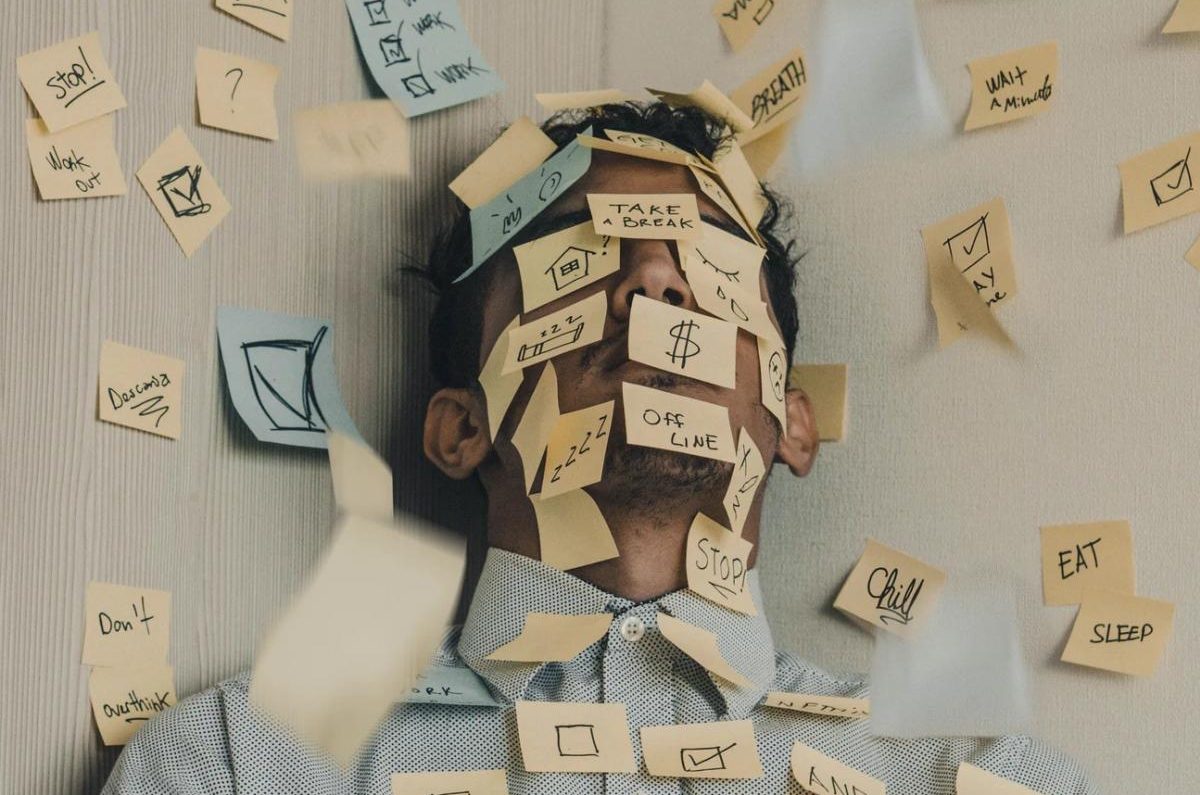

Dave Gusse • Jan 28, 2021 at 12:38 pm
Thought I was reading the Tribune. Thorough, thoughtful, inspiring and emotional. Great read!
Zehra • Jan 27, 2021 at 6:42 pm
SO relatable as a student, and to read the ‘behind the scenes’ of what our teachers went through to make school happen for us relays a much-needed sense of appreciation for all that 2020 has put them through as well. VERY WELL written..got the Dabezic Pepsi detail on point;)
Shelly Menendez • Jan 27, 2021 at 5:39 pm
Wow! This is a well-written and powerful story that showcases the human side of remote learning and its impact on educators. You should submit this story to other news sources. I work in the field of education research and this belongs in an editorial at Education Week. Kudos to you both.
Shelly Menendez
Mother to twin 8th graders at Crone MS
Education Researcher
Maria Wheeler • Jan 27, 2021 at 3:31 pm
So grateful for this awesome piece that helps me feel more connected to colleagues and comforted in the knowledge that I am not alone! This is beautiful.
Michelle Dorsey • Jan 27, 2021 at 2:46 pm
This is amazing! Thank you for taking the time to highlight the challenges teachers are facing.
Megan • Jan 26, 2021 at 8:19 pm
Such a beautiful piece. So many parts hit home for me as I’m a teacher and so is my mom. I also had a baby three weeks into the shut down that no one held for months. I teared up reading this. Thank you
Sarah Guzauskas • Jan 26, 2021 at 7:22 pm
This is outstanding. Thank you for sharing your experiences.
Char Haidley • Jan 26, 2021 at 7:05 pm
What a fantastic review of what it’s like to teach remotely. Kudos to the interviewers, and to the teachers who contributed their thoughts and feelings. The article is so well written, and it provides a great window to what life is like on the other side of the screen.
Char Haidley
Retired NVHS Teacher
Paul Vandersteen • Jan 26, 2021 at 4:57 pm
Phenomenal article! Possibly the best student piece I have ever read. Great work you two.
Dannah • Jan 26, 2021 at 3:41 pm
Alumni here! Thank you for amplifying the voices of your teachers. They’re dealing with the same world as we are while trying to educate students. They have super hero powers but aren’t invincible. Hope we can all continue to do what we can to protect and support each other. Great perspective from students and teachers alike.
Christina Jakubas • Jan 26, 2021 at 3:32 pm
Wow.
Aarti and Enoch, thank you for these words. I know all four of these teachers very well, and you have captured their essence, and in turn, all of the NV teachers’ emotions.
Casey Woodham • Jan 26, 2021 at 1:36 pm
Absolutely AMAZING!!!! Tears are streaming down my face!! Great job Aarti and Enoch! I am so proud of you both!!
Today was such a great day seeing students back in the building!